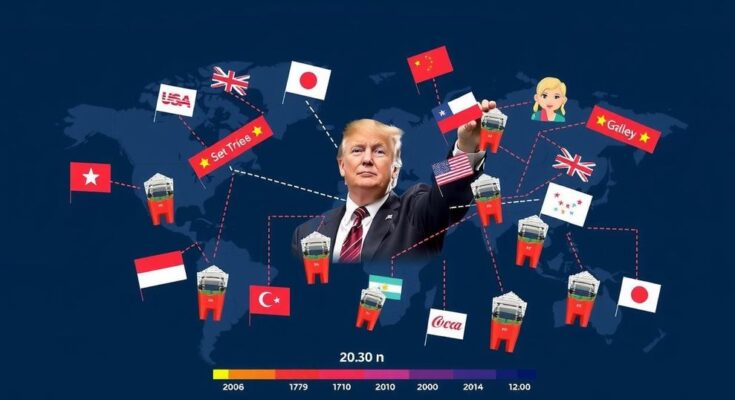Donald Trump has won the U.S. presidential election, becoming the 47th President. World leaders reacted promptly, with many expressing eagerness to work with him. Responses ranged from strong support in Israel and the Middle East to cautious optimism from European nations, while Iran adopted a more reserved position. This election is seen as a pivotal moment in reshaping international relations and diplomatic strategies.
Donald Trump has emerged victorious in the recent U.S. presidential election, marking a significant political comeback after a contentious campaign against Kamala Harris. His projected win in Wisconsin solidified his attainment of the necessary 270 Electoral College votes. In response, Trump expressed his aspirations for a “golden age” in America, lauding the movement he believes led to this remarkable electoral success. Despite his victory, Kamala Harris has not yet conceded, prompting her to schedule a statement for Thursday as world leaders convey their congratulations. Global reactions were swift, with leaders from various countries echoing their sentiments. Israeli Prime Minister Benjamin Netanyahu emphasized the renewed alliance between Israel and the United States, heralding Trump’s presidency as a significant victory. Middle Eastern leaders like Egypt’s President Abdel Fattah el-Sisi and Qatar’s Emir Sheikh Tamim bin Hamad Al-Thani voiced hopes for regional stability and cooperation under Trump’s leadership. Notably, Iran’s government downplayed the implications of the U.S. election on its internal policies. European leaders reflected a largely positive reception, with remarks from Government officials across NATO and EU nations expressing readiness to collaborate with Trump, citing shared values and commitment to stability and prosperity. For instance, European Commission President Ursula von der Leyen highlighted the strong partnership between the EU and the United States. Conversely, Russian and Iranian spokespeople maintained a more cautious stance, indicating a preference for observing Trump’s future actions rather than immediate congratulations. In the UK, Prime Minister Keir Starmer conveyed optimism about future collaboration, reinforcing the historical alliance between the nations. Leaders from nations such as India and Australia expressed their eagerness to strengthen bilateral relations and strategic partnerships with the incoming administration. This widespread global response underscores Trump’s pivotal role in international diplomacy and the anticipation surrounding his second term. As Trump transitions back into the White House, the political landscape both domestically and internationally is set for significant shifts, compelling nations to engage in strategic reevaluations of their relationships with the United States.
The recent U.S. presidential election has generated considerable international interest, with Donald Trump’s victory viewed as a pivotal moment in contemporary political history. Following a heated campaign against Democratic contender Kamala Harris, Trump’s reclaiming of the presidency signals a potential shift in U.S. domestic and foreign policy. As nations around the world respond to the election outcome, their statements reflect the varying degrees of anticipation or apprehension regarding future interactions with the United States under Trump’s leadership. The reactions illustrate the significance of American politics on global affairs, highlighting the intricate web of international alliances and diplomatic relationships.
In conclusion, Donald Trump’s electoral victory has prompted a wide array of responses from world leaders, reflecting a mixture of optimism and caution. As nations brace for the implications of Trump’s presidency, the comments made by various leaders reveal their hopes for renewed collaboration and stability while also indicating the complexity of international relations that may arise during his term. The evolving political dynamics demand careful observation as global leaders interact with the new administration, shaping the future of diplomatic endeavors and alliances.
Original Source: www.aljazeera.com




